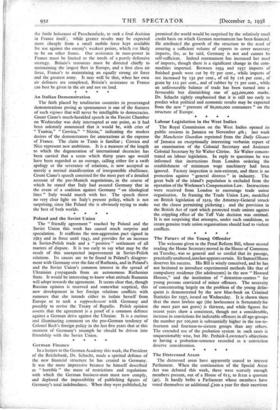* * * * .
The Future of the Young Offender The welcome given to the Penal Reform Bill, whose second reading the Home Secretary moved in the House of Commons on Tuesday, was so general and so cordial that its passage, practically unaltered, into law appears certain. Sir Samuel Hoare deserves his success. His Bill is wisely conceived, and he has not hesitated to introduce experimental methods like that of compulsory residence (for adolescents) in the new " Howard Houses," and the institution of " detention-centres " for young persons convicted of minor offences. The necessity of concentrating largely on the problem of the young delin- quent is demonstrated by the new blue-book on Criminal Statistics for 1937, issued on Wednesday. It is shown there that the most lawless age (the lawlessness is fortunately for the most part not grave) is thirteen, and while -figures for recent years show a consistent, though not a considerable, increase in convictions for indictable offences in all age-groups the number per too,000 is substantially higher in the ten-to- fourteen and fourteen-to-sixteen groups than any others. The extended use of the probation system in such cases is unquestionably wise, but Mr. Pethick-Lawrence's objections to having a probation-sentence recorded as tt conviction deserve consideration.
* *


























































 Previous page
Previous page